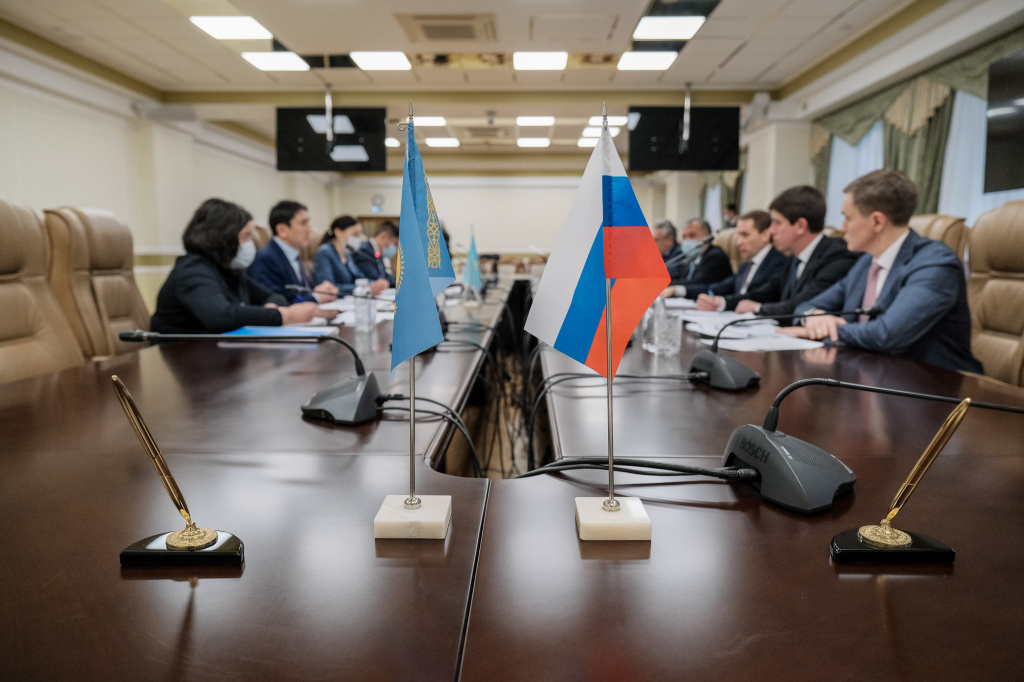Officials from Kazakhstan’s Ministry of Ecology, Geology and Natural Resources and Astana International Financial Center (AIFC) signed last week a memorandum of understanding (MoU) with Russia’s state geological company RosGeo, to strengthen hydrocarbons and mineral exploration.
“I am sure that through joint efforts we will achieve significant progress in increasing the investment attractiveness of the industry and the economies of our countries as a whole,” said Sergei Gorkov, Director General and Chairman of the Board of RosGeo, according to a report issued by the company’s website.
The agreement will facilitate the exchange of knowledge and expertise between specialists from Russia and Kazakhstan in the area of hydrocarbon and mineral exploration, regulation and the latest technologies. In addition, the two neighboring countries have agreed to carry out joint activities to develop non-bank financing of investment projects in the realm of geology, including exchange-traded instruments (ETIs) and “green” finance instruments.
RosGeo is Russia’s largest geological holding providing a wide range of services ranging from regional surveys for all types of mineral resources and estimation of the reserves to commissioning of the fields into operation. The holding is said to possess the unique competence in the area of offshore geological and on-shelf operations. Over the years, the companies within the holding have discovered more than 1,000 deposit fields, including some of the largest hydrocarbon and solid mineral deposit fields such as Astrakhan, Tengiz, Kovykta, Sukhoi Log and many others. The list of RosGeo’s customers includes such energy giants as Gazprom, Rosneft, Lukoil, BP, Chevron and others.
Government officials in Kazakhstan believe that the agreement will help attract more investors to projects within geological exploration industry, as well as to implement projects financing within the Astana International Financial Center (AIFC) in accordance with international standards.
“We consider it necessary to increase the depth of geological research, taking into account the introduction of new advanced technologies and cooperation with the AIFC in this area will increase the investment attractiveness of our countries,” said Magzum Mirzagaliyev, who heads Kazakhstan’s ecology, geology and natural resources ministry.
Launched in 2018, AIFC is like financial centers in Singapore and Dubai following British securities and corporate law, and offering visa and tax waivers to global financial investors. Members of AIFC are exempt from Kazakh corporate income tax, individual income tax, land tax and property tax for 50 years. The center incorporates Astana International Exchange (AIX), whose main strategic partners include Shanghai Stock Exchange, NASDAQ, Goldman Sachs, and others.
Hydrocarbons and minerals are the main pillars for both Moscow and Nur-Sultan as both Russia and Kazakhstan are flush with chemical compounds. The two post-Soviet countries have maintained strong partnerships in the energy sector through already existing close economic, technological and transportation initiatives.
Earlier this year, Mirzagaliyev announced that Kazakhstan would invest around $2.7 billion in a state-run program to collect geoscience data.
With an aim to expand the country’s mining sector and diversify hydrocarbon exploration, officials in Nur-Sultan will attract private sector investments worth 800 billion tenge ($2.1 billion) over the next five years. At the same time, the government is expected to budget another 200 billion tenge or $530 million for the project that is slated to be completed by 2025.







 President Ilham Aliyev shed light on the evolving contours of the peace process with Armenia during an international conference in Baku this week. ...
President Ilham Aliyev shed light on the evolving contours of the peace process with Armenia during an international conference in Baku this week. ...
 Azerbaijan and Armenia started the process of demarcation of their border on Tuesday, with the installation of the first border markers based on ge...
Azerbaijan and Armenia started the process of demarcation of their border on Tuesday, with the installation of the first border markers based on ge...
 Iranian President Ebrahim Raisi expressed Tehran’s readiness to participate in significant development projects in Sri Lanka during the inauguratio...
Iranian President Ebrahim Raisi expressed Tehran’s readiness to participate in significant development projects in Sri Lanka during the inauguratio...
 Turkmen President Serdar Berdimuhamedow and British Secretary of State for Foreign Affairs, Commonwealth Affairs, and Development David Cameron dis...
Turkmen President Serdar Berdimuhamedow and British Secretary of State for Foreign Affairs, Commonwealth Affairs, and Development David Cameron dis...



